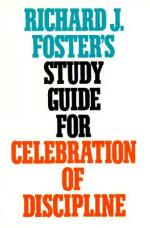
|
| Name: _________________________ | Period: ___________________ |
This test consists of 15 multiple choice questions and 5 short answer questions.
Multiple Choice Questions
1. According to the author, what are the two types of difficulties a person will face when practicing the spiritual disciplines?
(a) Mental and physical.
(b) Practical and emotional.
(c) Mental and emotional.
(d) Philosophical and practical.
2. According to Foster, what does being simple like God mean?
(a) Praying often.
(b) Spending and acquiring less.
(c) Confessing everything.
(d) Having very few clothes.
3. In The Door to Liberations, how are ingrained habits conquered?
(a) Legalistic discipline.
(b) God's grace.
(c) Self-injury.
(d) Fasting.
4. According to Foster, how does study benefit meditation?
(a) They are unrelated.
(b) It makes the environment more conducive for meditation.
(c) Study helps the person get into a peaceful frame of mind.
(d) Meditation makes studying look easy.
5. What is the definition of an "absolute fast"?
(a) Only water.
(b) No meats.
(c) Going without solid food, liquids, and water.
(d) No lunch.
6. What is the author's profession?
(a) Quaker pastor.
(b) Social worker.
(c) Medical doctor.
(d) Psychologist.
7. The author warns against purchasing what?
(a) Food and drink.
(b) Useless gadgets.
(c) Clothing.
(d) Expensive homes.
8. What does the author say becomes an ingrained habit?
(a) Eating.
(b) Sin.
(c) Being lazy.
(d) Talking.
9. What is an example of verbal study?
(a) Conversation.
(b) Natural observation.
(c) Lectures.
(d) Labs.
10. According to the author of this book, how can people learn they can trust God to provide them with what they need?
(a) Pleading through prayer.
(b) They cannot learn this.
(c) By trial and error.
(d) By creating simple lives.
11. The author thinks that what sort of environment is good for meditation?
(a) A dark space.
(b) Any.
(c) The outdoors.
(d) One that is quiet and peaceful.
12. What law in the Bible applies to fasting?
(a) None.
(b) Leviticus.
(c) Genesis.
(d) Exodus.
13. Foster says that true prayer requires what of us?
(a) Love for God.
(b) Friends.
(c) Knowledge.
(d) To let go of our own will.
14. Foster writes that we should offer prayers to God for requests, as well as what?
(a) Supplication.
(b) Acknowledgment.
(c) Prayers for healing.
(d) Thanksgiving.
15. What are the two types of study, as stated by Foster?
(a) Inner and outward.
(b) Light and deep.
(c) Verbal and nonverbal.
(d) Spiritual and global.
Short Answer Questions
1. According to The Discipline of Meditation, what does meditation begin with?
2. How much longer was this edition written after its first publication?
3. How many principles does the author give to living a simpler life?
4. Who is the religion publisher?
5. Why does the author say most people are afraid of meditation?
|
This section contains 426 words (approx. 2 pages at 300 words per page) |

|




